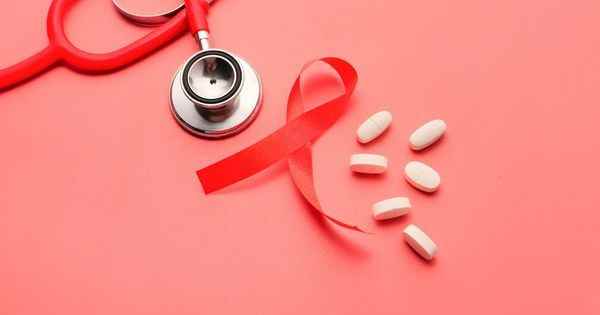Updated on 12/01/2021
3 min read
Less prevention actions, medical consultations, research … The coronavirus pandemic has had direct consequences on the fight against AIDS in France and throughout the world and the number of tests continues to drop.
In France in 2019, it was estimated that 24,000 people were unaware of their HIV status. A figure that exploded in 2020, the Covid-19 health crisis having greatly impacted the HIV testing activity and more generally the fight against AIDS.
World AIDS Day
On the occasion of World AIDS Day on December 1, Public Health France publishes the latest surveillance data for HIV and sexually transmitted infections (STIs). The most glaring element is the sharp drop in the number of discoveries of HIV seropositivity and bacterial STIs: a 22% decrease in the number of discoveries of HIV seropositivity in 2020, compared to 2019. HIV testing activity, which had nevertheless increased between 2013 and 2019, decreased by 14% between 2019 and 2020.
In question, the decrease in the use of screening in 2020, especially during the first confinement. Florence Lot, from the infectious diseases department of SPF, also mentions “lower exposure to HIV linked to physical distancing measures”. Note, however: Santé Publique France believes that the pandemic is also linked to the drop in the participation of health professionals in surveillance systems.
The consequences are important: a possible delay in diagnosis and access to antiviral treatments, the preventive effect of which has a direct impact on the dynamics of the epidemic. Public Health France has therefore decided to re-broadcast a campaign to increase knowledge of the preventive effect of antiretroviral treatment and fight against discrimination linked to HIV seropositivity.
More risk of transmission
We know more about the people affected by the decrease in the number of HIV-positive discoveries: they are mostly born abroad, regardless of their mode of infection. “This decrease can be explained by access to screening made more particularly difficult for this population in the context of the health crisis” indicates the press release. In addition in 2020 30% of HIV infections were diagnosed at an advanced stage of infection : this constitutes a “loss of chance at the level of care“ and “a higher risk of transmitting HIV to partners before starting treatment “. Three STIs are also affected by the drop in screening in 2020: infections with Clamydia trachomatis, gonorrhea and syphilis.
“The early treatment of the greatest number of people infected with HIV is a major public health issue. Getting tested is crucial to reduce the time between infection and diagnosis and to access treatment as soon as possible for the benefit of both individually and collectively. Let us remember, antiretroviral treatments allow people living with HIV to live in good health, with a restored life expectancy, without fear of developing AIDS and without risk of transmitting the virus. Information campaigns are essential for the perspective of HIV-positive people to change definitively. Promoting a better understanding of the reality of life with HIV today also helps to remove the brakes on screening “ declared Prof. Geneviève Chêne, Director General of Public Health France.
“Living with HIV is first and foremost about living”
The French Public Health companion wishes to recall that HIV status is “not an identity, nor a problem, nor a barrier to romantic relationships and that people living with HIV and having effective treatment cannot transmit the virus”. The objective is therefore to deconstruct received ideas and encourage screening through displays, partnerships, testimonials … If you want to learn more about HIV and STIs, you can go to the site Sexuality question and Sexosafe , which notably offers prevention tools for men who have sex with men.
.
dts1
